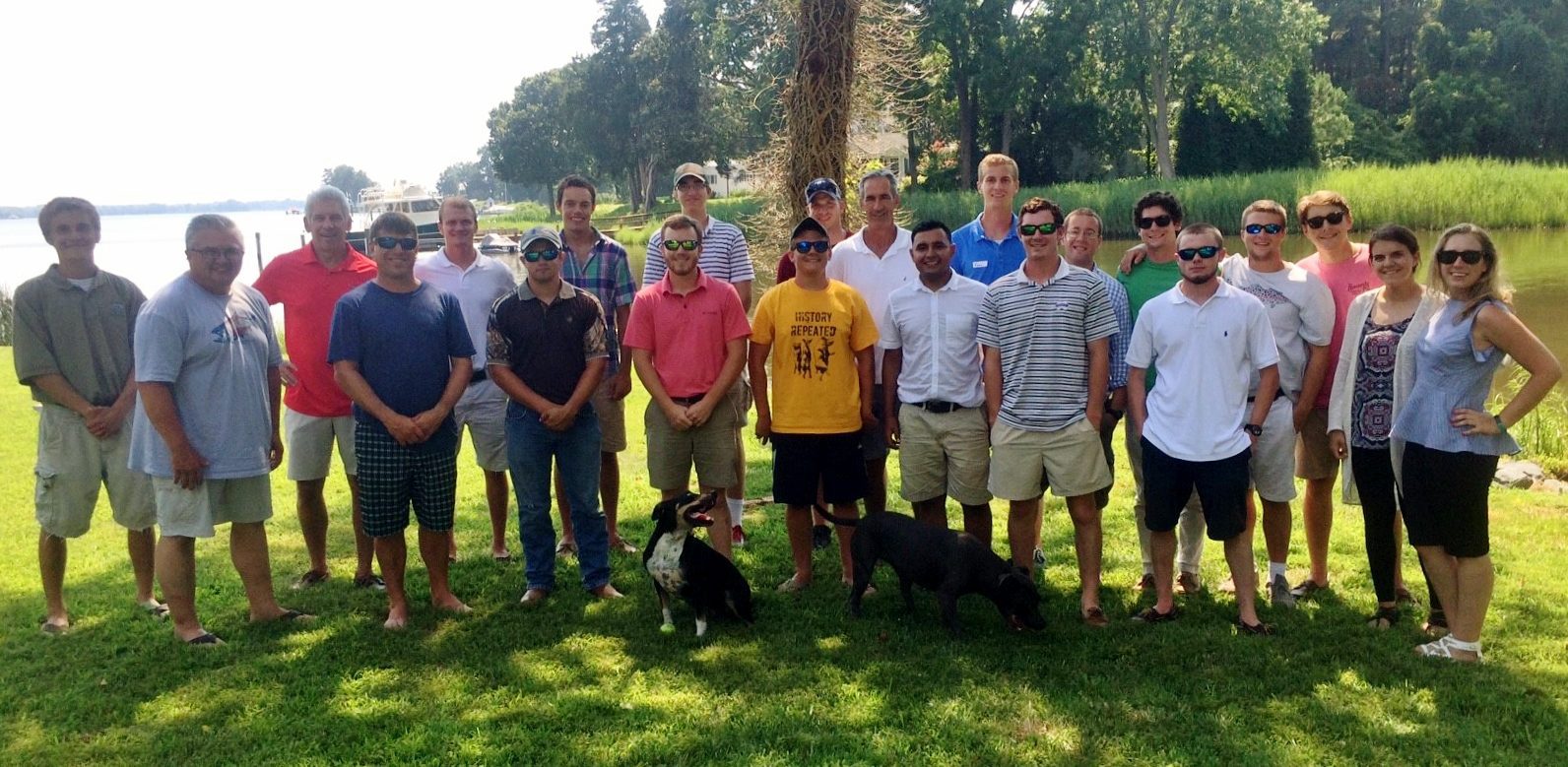
Our Summer 2016 Interns at our annual Intern Day event in St. Michaels, MD.
We caught up with a few of our summer interns to ask them what they’ve learned and how they hope to apply that knowledge to their future careers.
 Joe Mills interned at our Gainesville maintenance branch and is studying horticulture/landscape contracting at Virginia Tech
Joe Mills interned at our Gainesville maintenance branch and is studying horticulture/landscape contracting at Virginia Tech
 Anthony Pacheco interned at our Lilburn maintenance branch and is studying biology/environmental sciences at Georgia State University
Anthony Pacheco interned at our Lilburn maintenance branch and is studying biology/environmental sciences at Georgia State University
 Stephanie Whealton interned in our corporate employee development department and studied business administration/human resource management at Towson University
Stephanie Whealton interned in our corporate employee development department and studied business administration/human resource management at Towson University
What major/area of study are you focusing on in school? Why did you choose that major/area?
Joe: I’m majoring in landscape contracting, which is a specific focus of the horticulture major at Virginia Tech. I chose this major because it encompassed what I wanted to do in my career: design, build, and maintain landscapes.
Anthony: I am a declared biology major, but I am focusing on the environmental sciences. I chose this because I have a deep appreciation for nature and I love being outdoors.
Stephanie: I majored in business administration with a concentration in human resource management. I chose this because I recognized that people are the number one asset a company has and I wanted to learn more about that connection.
What made you consider a career (or at least an internship) in the green industry?
Joe: It’s what I’ve always wanted to do. I remember being four years old and watching my neighbor’s house be mowed with Exmark Turf Tracers. From then on, I’ve thrown myself into the industry by working at a garden center and having my own company in high school, continuing in college by learning everything I could along the way. I enjoy the work very much and it’s always gratifying to see a project through from the beginning to the end result. I decided I wanted an internship in order to further my skills in the industry.
Anthony: I come from a huge pedigree of landscapers. My grandfather was a landscaper; my uncles, aunts and cousins are all landscapers. So for me it feels natural and I am proud to say that I am a third generation landscaper. Also, I hope to continue to further my studies and become a certified landscape designer because I love to draw and look forward to using that skill in the green industry.
Stephanie: I’m interested in sustainability because I’d like my future family to be able to enjoy the environment as much as I do. I want to work in an industry that sparks my interest and helps me learn more about the things that I care about.
What made you choose Ruppert Landscape for your internship?
Joe: I interviewed with multiple companies, but ultimately chose Ruppert because I liked how the internship was structured to fit what I wanted to learn and I was impressed with how professionally Ruppert treated me even as just a freshman in college.
Anthony: I chose to intern at Ruppert Landscape because it’s a company that values and empowers its employees to become the best landscape professionals. Ruppert Landscape also gives back to its communities through volunteer service and that is what attracted me the most when choosing this internship.
Stephanie: I chose Ruppert because I felt that I would grow here. Many of my classmates took on internships and were assigned menial tasks because others didn’t want to do them. When I interviewed here, my mentor, Chris Schneider, promised that I’d be working directly with him to develop my professional skills and learn about employee development.
What was the best experience you had during your internship?
Joe: It’s very hard to say exactly what my best experience was as there were a lot of them. I would say my best experience was when I estimated a shopping center for a maintenance bid with our branch’s business developer, Michael Jones. It forced me to really think hard about my decisions and calculations.
Anthony: I enjoyed working with everyone at the Lilburn, GA maintenance branch. Whether it was throwing pine straw with the enhancement crew (Anthony DaSilva, Hazzie Harris, Tyler Pereira, Cordero Cobb, Ervyn Rodriguez, Dennis Coble, Nick Williams), cutting tall fescue grass with the maintenance crew (Ricardo Correa, Luis Florez, Matt Jones, Jeff Thomas, Angel Obando, Jose De Paz, Joaquin Mendoza, Alvaro Avila, Carlos Pacheco), digging up trenches in irrigation with Chris Gramley, processing invoices with Kurt Myers, measuring sites with Syed Ali and limbing up trees with Stephen DeWeese. I thoroughly enjoyed every part of this internship.
Stephanie: I attended the Built Upon A Dream community service event at The Children’s Home in Catonsville, where I got to see our crews doing what they do best. It was awesome to see how our hard work can make a difference, not only on the property but also in the lives of others. It made me happy to know that the people who call this facility their home would have a more attractive and nurturing environment to live in.
What is the best advice that you got while being an intern OR what advice would you give someone else about doing an internship?
Joe: I would say try anything and everything. Learn as much as you can while you’re there. Don’t be afraid to ask questions. I learned so much valuable information from talking to everyone I could: field managers, area/enhancement managers, mechanics, business developers, etc. Work out an equal balance of being in the field with crews and in the office. There’s a lot to learn in both settings. Also, keep a record of what you did each week and take lots of pictures.
Anthony: The best advice that I received as an intern was to find a better way to do things using the Ruppert value of “Hustle and Efficiency.” For example, placing the wheelbarrow at an angle or laying it down when loading helps by adding more mulch at a faster pace and saving time. Or how using a tool’s leverage to your advantage (like a pitchfork) spreads mulch more efficiently while putting less strain on your back. I highly recommend future interns build a relationship with everyone. Make sure everyone knows your name and ask lots and lots of questions.
Stephanie: I’m a big fan of asking questions because that’s how you learn. At times, it can seem intimidating to chime in with a question, but everyone knows that interns aren’t the experts and everyone at Ruppert was always more than willing to share their knowledge with me.
What do you feel like you’ve gained from this internship? How will you apply that to your future work and/or school experiences?
Joe: I feel I’ve gained a lot of valuable knowledge about the landscape industry as a whole. Not just new techniques and ways to execute a particular activity or task, but how a large commercial landscape company operates. I’ve learned how to treat and truly value a good employee. As Ruppert’s number one value is people, this is truly an important concept to apply in my future work and school experiences. I will apply it by always treating people with respect, especially if they’re under my supervision.
Anthony: This internship has taught me to be a better communicator. Communication is really important, especially when you are working in a team. Therefore, I will apply better communication skills by listening more when doing group projects at school and/or work.
Stephanie: My internship helped me pull together all of the concepts that I’ve learned in school and also in life so far. It’s like putting together the pieces of a puzzle; you have many different pieces and when they’re separate, it’s hard to see the big picture. Now that my picture is starting to come together, it gives me more confidence that I can apply my skills and be an asset to the company I’m working for.
What are some misconceptions about the green industry that you have heard of/faced? How has your internship either disproved or validated those ideas?
Joe: I’ve heard a few common misconceptions about the green industry: there is no money to be made; this is not a promising career field; this industry is not as complicated as other trades. My internship has disproved those ideas for me. I’ve learned that Ruppert likes to promote from within and career advancement is always an opportunity. I’ve learned that there are extremely promising markets that are expanding and the need for landscaping is growing. And of course, this industry is not simple by any means. I’ve learned that it takes a strong balance of committed people to get a branch to run successfully and stay profitable. There are a lot of factors at play when it comes to running a successful landscape company.
Anthony: A common misconception about the green industry is that it is all labor-intensive physical work. My internship disproved this because it requires you to think and plan accordingly. Using the job scripts, recording mower hours, budgeting labor hours, counting number of bales needed for a site, scheduling routes, etc. All requires you to think!
Stephanie: When people talk about the green industry or green products, they’re usually talking about how expensive they are. The Laytonsville campus is LEED-certified which means that it’s a leader in energy and environmental design. To get this ranking, Ruppert spent their dollars on green building materials and implementing efficient systems within the corporate and branch office. One of Ruppert’s values is to watch the pennies, so even though they took the upfront expense, they see returns from it in the form of smaller energy and water bills as well as the knowledge that they are making a smaller footprint on the environment.
How can we as an industry do a better job of challenging those misconceptions?
Joe: By educating employees and potential employees to show how these misconceptions are incorrect. A great way to educate potential employees is to set up a job shadowing program. The program would work by letting the potential employee shadow someone at their local branch for 2-3 days. Specifically for college students, it would be great to set them up with someone at their local branch for a few days, either on winter or spring break. This way students could get a taste of the work, the career opportunities and decide if that’s something they’re interested in or not.
Anthony: It is important to attract and recruit college students who are good with numbers, planning and finding more innovative ways to get the job done.
Stephanie: I would say to keep promoting the benefits of going green to our customers and educating them about products that are available for them to implement at their home, business, or property. The easier that we can make it for them, the more buy-in we’ll see.